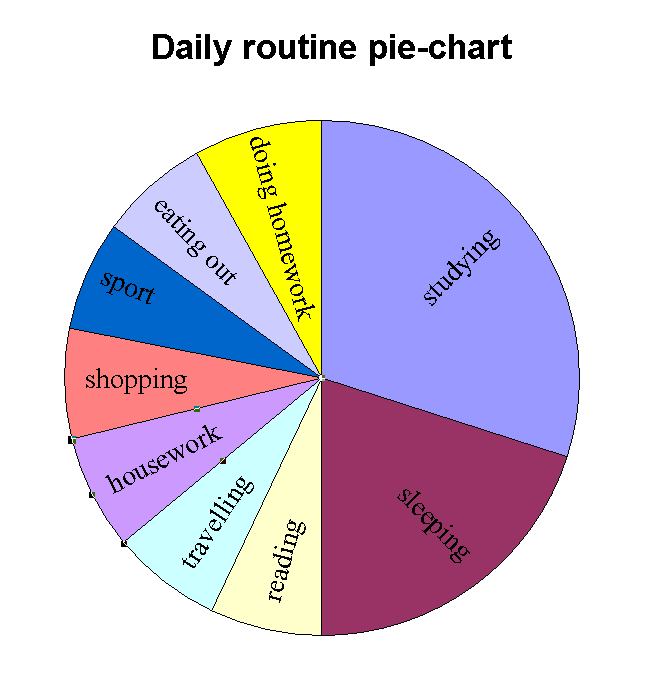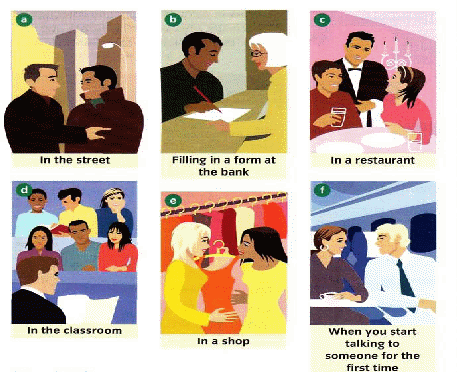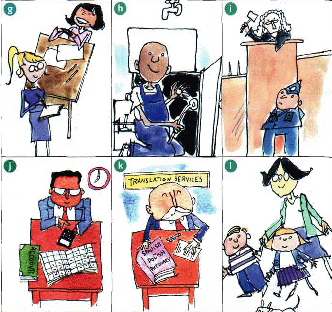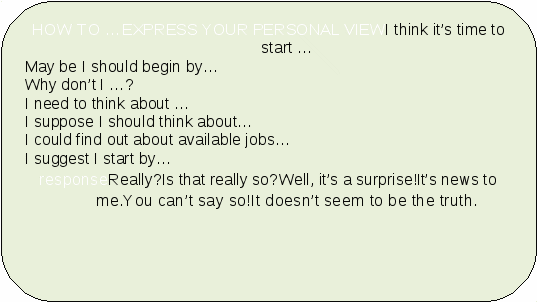Fill in the gaps with appropriate words.
How late do you … on the weekend?
We need to buy … for tonight's party.
You should … time and money for your next vacation.
I … the bus every morning at 7:15 a.m.
After I … work, I'll drop by your house.
Be sure to … enough money to pay for books.
C. Listen to the conversation and answer the questions.
1) What time does the man get up?
at 5:00 a.m.
at 6:00 a.m.
at 7:00 a.m.
2) What time does he get to work?
at 7:00 a.m.
at 8:00 a.m.
at 9:00 a.m.
3) What does he do with his family around 6:30 p.m.?
They read books together.
They play games.
They eat dinner.
4) What do the man and his wife do after the kids go to bed?
They watch TV.
They clean the house.
They listen to music.
5) What is one thing the man does NOT say about his wife?
She has to take their children to school.
She helps the kids with their homework.
She goes shopping for food.
D. Think about and write down your typical schedule for a weekday and a weekend.
READING: HOW WE REALLY SPEND OUR TIME
Read the following statements. Which do you think are true for your country? Compare your ideas in groups.
People are working longer hours than in the past.
Watching TV is the most popular leisure time activity.
Most people read a newspaper regularly.
The majority of women work full-time.
Women do the main share of the housework.
People are eating more and more ready meals and takeaways.
The majority of young people have a full-time job by the time they are twenty.
Young people these days spend more time socializing than doing homework.
Pensioners are more physically active than teenagers are.
Regular Internet users are often keen on sport as well.
The majority of people take part in a sport at least once a week.
People waste a lot of time at work.
B. Read the text. Which country (or countries) does each of the statements in exercise A refer to? Which are true all over the world?
How we really spend our time
Time, it seems, is what we are all short of these days. One reason, perhaps, why there are thousands of studies every year into how we spend our time and how we could spend it better. Some of the results are startling. Did you know, for example …?
Although people all over the world are working longer and longer hours, we also have more leisure time than ever before.
After sleeping and working, watching TV is by far the most popular leisure activity the world over. Several decades ago people spent more time walking outside or doing sports.
According to the recent research, the British watch more TV than any other nation in Europe, but they also read more. The vast majority, eighty-five percent, regularly read newspapers, and fifty-four percent regularly read books.
Although up to two thirds of modern European women work full-time, they still do the main share of the housework, too. Husbands help more in the house than they did in the past, but in the UK, for example, men do an average of just six hours a week compared to their wives, who do over eighteen hours. No wonder that the vast majority of working women in the UK say that they are stressed and exhausted!
According to the latest survey by supermarkets, the average British family spends just eleven minutes preparing the main evening meal, that is six times less than it used to, and prefers ready meals and takeaways to home-cooked food. Almost half of all families in the UK eat together only once a month or less.
More than half-young people in the UK have a full-time job by the age of nineteen, but the majority of young Spanish and Italian people do not start full-time work until they are twenty-four.
Teens, who half a century ago were playing football in the backyard, are now surfing the Internet all the day round. The average American fourteen-year-old spends only half an hour doing homework, and less than a fifth of young people participate in sports, clubs, music or other traditional hobbies. Instead, sixty-five percent say they spend their time chatting on their mobiles and hanging out with their friends in shopping malls.
In the UK, pensioners are almost twice as active as teenagers, according to recent research. People over sixty-five spend nearly two hours a day doing physical activities such as walking, cycling, gardening or sport, while teenagers spend only seventy-five minutes. However, surprisingly, people who use the Internet regularly do more sport than people who never use it.
The Swedes and Finns are the sportiest nationalities in Europe. Seventy-three percent do some kind of sport at least once or twice a week.
People may spend more time at work these days but are they always working? The latest research reveals that each day the average British employee spends fifty-five minutes chatting, sixteen minutes flirting, fourteen minutes surfing the Internet and nine minutes sending e-mails to friends.
Write down four things from the text that you think are surprising or interesting. Compare with your partner.
Are you happy with the way you use your time? What would you like to spend more/less time doing? Discuss in groups.
GRAMMAR 2: PAST TENSES
Past Simple
|
Formation
|
V2
I fell asleep very quickly last night.
My brother-in-law lived in Moscow in 2008.
|
Question form
|
did + subject + V1
Did I fall asleep very quickly last night?
Did my brother-in-law live in Moscow in 2008?
|
Negative form
|
did + not (didn’t)
I didn’t fall asleep very quickly last night.
My brother-in-law didn’t live in Moscow in 2008.
|
Usage
|
past action or a series of completed past actions
|
Signal words
|
yesterday, …years ago, last year, last month
|
Past Progressive
|
Formation
|
was/were + Ving
I was making my breakfast when Tom came.
We were doing the shopping while our sisters were doing the housework.
|
Question form
|
was/were + subject + Ving
Was I making my breakfast when Tom came?
Were we doing the shopping while our sisters were doing the housework?
|
Negative form
|
was + not (wasn’t)/were + not (weren’t) + Ving
I wasn’t making my breakfast when Tom came.
We weren’t doing the shopping while our sisters were doing the housework.
|
Usage
|
action in progress in the past, two or more actions in progress at the same time
|
Signal words
|
from …to …
|
Past Perfect
|
Formation
|
had+V3
He had already fed the cat when I came.
They had done the washing-up.
|
Question form
|
had + subject + V3
Had he already fed the cat when I came?
Had they done the washing-up?
|
Negative form
|
had + not (hadn’t) + V3
He hadn’t already fed the cat when I came.
They hadn’t done the washing-up.
|
Usage
|
action happened earlier than an action which followed
|
Signal words
|
before
|
A. Identify the tenses of the underlined verbs in the text above.
B. Open the brackets paying attention to the usage of Past Simple tense (negative/question/affirmative forms).
The majority of women (not to work) full-time in London in 1980-s.
When I (to study) at school I (not to be keen) on sports at all.
We usually (to have) friends for dinner when we (to live) in a village.
I usually have one or two snacks during a day but I (to be in a hurry) yesterday so I (not to have) any.
Last year we (to go) to Paris where we (to see) a lot of interesting places, (to do) the shopping, (to go) to bed very late because we (to chat) a lot with our new French friends.
I (to pull) myself together easily at our last meeting because I (to have) an early night.
(To work) extra hours when you (to work) at Linkist, ltd?
What you (to be) responsible for at your previous job?
How much your brother-in-law (to earn) when he (to work) for Mr. Blake?
My holiday pay last year (to be) 1,000 $.
Choose the best alternative between Past Simple or Past Progressive.
I was doing/did my shift from 8 a.m. to 8 p.m. on Tuesday.
I was managing/managed Sales department last year.
When he was arriving/arrived we dealt/were dealing with a very difficult project.
We often took/were taking takeaways when we were staying/stayed in a hostel.
How was he earning/did he earn his living?
What were you advising/did you advise your clients yesterday?
Laura didn’t want/wasn’t wanting to deal with lots of paperwork, so they were dismissing/dismissed her quite quickly.
The sun shone/was shining brightly so, he was deciding/decided to lie-in a bit longer.
I envy my nephew, when he lived/was living in another city. He did/was doing what he was wanting/wanted to do, slept/was sleeping longer, wasn’t doing/didn’t do any housework, etc.
Who were you working/worked for last year in the USA?
Read the text and open the brackets using Past Simple or Past Perfect tenses.
It (to happen) two years ago. Martha (my sister) and I (to decide) to make a trip to Canada. We (to pack) our suitcases rather quickly. Martha (not to be fond of) ironing very much that time so, she (to be) very surprised that I (to iron) all her clothes beforehand. When we arrived in Toronto we suddenly (to understand) that we (to leave) the address of our hotel on the table at home. Martha (to be) in panic of course I (to try) to pull myself together. We (to start) searching for our hotel. It (to turn) out that they have six hotels with the same name located in different parts of the city. We (to take) a taxi and (to go) around the city. As I (to know) the city well we (to find) our hotel soon. Surprisingly, the driver who (to give) us a drive round the city (to offer) me to work as a tour guide for those who (to come) from Paris. I (to agree), moreover, I (to have) an experience in Morocco. I (to be) in charge of different tours around the city and fortunately I never (to deal) with complaints. Our trip (to be) fascinating and we (to be) glad that we (to forget) our hotel’s address at home.
Supply the suitable form of past tenses.
It (to rain) heavily so, we (to decide) not to go hiking but to invite friends to our house and cook dinner together.
I (to refer) to John when I told the meeting about our current problem.
No, I (to go) to Italy two years ago.
When I last went to Italy, a team of scientists (to examine) the falling tower of Pisa.
What you (to do) when I phoned yesterday?
By the time we got to the cinema the film (to start), so we missed the first five minutes.
I spent a week in Miami recently. I (not to be) there before.
She told me she (to attend) a lot of meetings in Prague.
When I (to get back), nobody (to do) the washing up. I was furious.
GRAMMAR: QUESTIONS
Types of questions
|
yes/no questions
|
Do you like dealing with figures?
Did you visit the headquarters yesterday?
Were you present at the conference last week?
|
wh-questions
|
What did you do in the office last weekend?
|
wh-question words
|
what, where, when, who, why, which, whose, how
|
wh-question words together with other words
|
what time, how much, how many, how often, how long, which one
What time did you finish the report?
How long have you worked here?
|
Word order
|
When the main verb is to be, put the verb before the subject.
Where were you yesterday?
|
When there’s a main verb (with no auxiliary verb), we put do/does/did before the subject +infinitive.
Do you like working as an accountant?
|
For verbs with an auxiliary, we put the auxiliary verb (have/has/had/will/can/ would etc.) before the subject.
Can you play business games?
|
Subject questions
|
When we are asking about the subject of a sentence, the verb comes after the question word (we don’t use an auxiliary)
Who comes to visit us on Friday? NOT: Who does come to visit us on Friday?
Who left the door of the meeting room open? NOT: Who did leave the door of the meeting room open?
Which company produces equipment better? NOT: Which company does produce equipment better?
|
Object questions
|
When we are asking about the animate object, we can also use the question word who. But the word order is reversed.
The client complained to the manager.
Who complained to the manager? (subject question)
Who did the client complain to? (object question)
|
Tag questions
|
A tag question is formed by an auxiliary + subject: did she? aren’t they? have you? Positive sentences are generally followed by a negative tag, negative sentences – by a positive tag.
They went to the conference, didn’t they?
He’s waiting for his boss, isn’t he?
|
Embedded questions
|
Embedded questions are those that are hidden in long questions. In the normal question the position of the subject and the auxiliary is reversed, while in embedded questions it is like in affirmative sentences.
Where is the bank? (normal question)
Could you tell where the bank is? (embedded question)
|
Write the words in the correct order to make questions.
coming / are / time / your / business partners / what
to work / you / always / why / drive / do
worked / how long / in / that company / she / has
last / make / a good presentation / did / when / you
tonight / are / make / your business plan / you / to / going
you / would / business lunch / like / tomorrow / to / have / with me
going / are / on business trip / time / where / next / you
her / make / a report / often / does / how / she
Insert the proper words and write the questions.
e.g. My favorite brand is ….
What is your favorite brand?
I like dealing with ….
What …?
We usually go to … for our holidays.
Where …?
She prepared the … for a newspaper.
What …?
I bought …
What …?
My boss can … really well.
What…?
I’m going to start driving lessons in …
When …?
They were late for a job ... last week.
How many times?
Make who- or what-questions.
You were talking to someone.
Somebody gave me the credit card.
This report belongs to somebody.
I borrowed the money from somebody.
My boss telephoned me.
I am worried about my colleagues.
Somebody works in that office.
My brother sold his shares.
They have invited many guests to the business meeting.
My colleague told me about a new contract.
Make up tag questions.
You don’t like interviews.
She arrived yesterday.
This company is very famous.
She’s gone home.
He’s got no money at the moment.
You’re always forgetting your office password.
She didn’t like a new employee, when she met him.
We’ll go to a business trip next week.
Make an embedded question or a new sentence from the question in brackets.
(Where has Tom gone?) Do you know where Tom has gone?
(Where is the post office?) Could you tell me where …?
(What time does the conference begin?) I wonder …?
(What does this report mean?) I would like to know …?
(What time did the boss leave?) Do you know …?
(Is Sue busy tonight?) I don’t know ….
(Where does Carol work?) Have you any idea …?
(Where did I leave my cell phone?) I can’t remember ….
(Why didn’t Kay come to the business lunch?) I don’t know …
(How far is it to the airport?) Can you tell me …?
S PEAKING PEAKING
You are going to interview your partner in order to complete a similar pie-chart how he/she spends his/her time. First spend a few minutes preparing for the interview. Think about:
the questions you will ask your partner to find out how he/she spends his/her time.
any special vocabulary you need to describe your interests.
Work in pairs. Interview your partner and draw his/her pie-chart. You’re going to tell the rest of the class about your partner, so find out as much as you can.
B. Look at the pictures. Discuss with your partner what questions in the box below can be asked in situations a-f. Add two or three questions to each situation and role-play small dialogues.

What’s your date of birth?
|
Where are you from?
|
How long are you going to stay?
|
What time is it?
|
Where is the nearest (bank)?
|
Can I help you?
|
Which part of (Russia) are you from?
|
Do you speak English?
|
Sorry, could you repeat that please?
|
How do you spell …?
|
Can we have the bill, please?
|
Anything else?
|
VOCABULARY 2: WORK DUTIES
Study the following.
What do you do?
People may ask you about your job. They can ask and you can answer in different ways:
What do you do?
What's your job?
What do you do for a living?
|
I'm (+ job) a banker/an engineer/a teacher/a builder
I work in (+ place or general area) a bank/marketing
I work for (+ name of company) Union Bank, Fiat
|
NB'Work' is usually an uncountable noun, so you cannot say 'a work'. If you want to use the indefinite article you must say ‘a job’, e.g. She hasn't got a job at the moment.
What does that involve? = What do you do in your job?
When people ask you to explain your work/job, they may want to know your main responsibilities, or something about your daily routine. They can ask like this: What does that (i.e. your job) involve?
Main responsibilities
I'm in charge of all deliveries out of the factory.
I have to deal with any complaints.
I run the coffee bar and restaurant in the museum.
Daily duties/routines
I have to attend a lot of meetings.
I visit/see/meet clients. I advise clients.
It involves doing quite a lot of paperwork.
Pay
Most workers are paid every month and this pay goes directly into their bank account. It is called a salary. We can express the same idea using the verb to earn:
My salary is $60,000 a year. = I earn $60,000 a year.
With many jobs you get holiday pay and sick pay (when you are ill). If you want to ask about holidays, you can say: How much holiday do you get? orHow many weeks' holiday do you get?
The total amount of money you receive in a year is called your income. This could be your salary from one job, or the salary from two different jobs you have. And on this income you have to pay part to the government - called income tax.
Working hours
For many people in Britain, these are 8.30-9.00 a.m. to 5.00-5.30 p.m. Consequently people often talk about a nine-to-five job. Some people have flexi-time; and some have to do shiftwork. Some people also work overtime. Some people are paid to do/work overtime, others are not paid.
Match the definitions with the italicized words and phrases from the text.
to go to
to include
to be responsible for
to be in control of/manage
to give somebody help and opinion
to take all necessary action
7) to work extra hours
8) duties
|
what you do every day/week
people one does business with or for
11) regular working hours
12) work at different times
13) irregular working hours
14) a general word we use for routine work that involves paper e.g. writing letters, filling in forms, etc.
|
Match the verbs on the left with the nouns or phrases on the right to form collocations. Use each word once only.
-
to earn
to work
to pay
to go to
to deal with
to run
|
overtime
meetings
a shop
clients
£500
income tax
|
D. Starting with the words you are given, rewrite each of these sentences using vocabulary from the text. The basic meaning must stay the same.
1)I am a banker.
I work in banking.
What do you do?
What's …?
3) I earn $50,000 dollars.
My…
4) I get £20,000 from my teaching job and another £10,000 from writing.
My total …
5) I am an economist.
I work for …
6) In my job I have to look after and maintain all the computers in the building.
My job involves …
7) I'm responsible for one of the smaller departments.
I'm in …
E. This is part of a conversation with an accountant about her job. Can you supply the missing questions?
A: …?
B: I usually start at nine and finish at four.
A: …?
B: Yes a bit. Sometimes I work until five o'clock, and then I get paid extra.
A: …?
B: Four weeks. That's one of the bad things about being an accountant.
A: …?
B: Yes, we do. That's one of the advantages of being an accountant.
F. Can you answer these general knowledge questions about work?
What are normal working hours for most office jobs in your country?
Can you name jobs that get very high salaries in your country?
When you start paying income tax in your country, what is the minimum amount you have to pay?
What jobs often involve shiftwork? (Give at least two examples.)
Is flexi-time common in your company or your country?
G. Add one job to each letter below. Use the pictures to help you.
A is for architect and ….
|
B is for barman and ….
|
C is for civil servant and ….
|
D is for doctor and …
|
F is for farmer and ….
|
J is for journalist and …
|
L is for lawyer and …
|
N is for nurse and …
|
P is for psychologist and …
|
S is for shop assistant and …
|
T is for taxi driver and…
|
W is for writer and …
|


H. Think of the job, but don’t say what it is. Describe the job by saying about the responsibilities and routine. Let other students guess what job you’re describing.
WRITING: INFORMAL EMAIL
Read the email and answer these questions:
What is Gaby describing?
What is Gaby doing?
Where is Gaby flat?
What does Gaby ask Enrico?


Hi Mike,
I’ve got so much to tell you. Things are different for me now. Last September we moved to Canada. Before we had lived in France for 6 months. We’re here for a year.
James changed a lot of jobs. He was working in a shop, for an IT company, but now he is working for a bank in Vancouver and I’m studying at the film school. We’re staying in a lovely flat in the centre of the town. There are a lot of things to do in the city, but every weekend we go the countryside. It’s really beautiful!
Last summer we couldn’t have a rest, but next summer we’re going to visit my parents and to have a trip around Europe.
What about you? I’d love to know what you’re doing these days. Send me an e-mail soon.
Love, Gaby xxx
|
 
B. Write an e-mail to a friend you haven’t talked to for long time. Tell him/her about the way you have spent your summer holidays. Mind past tenses (past simple, past continuous, past perfect).
WORD FILE
Unit 1 Module 2
|
daily routine
ready meals
takeaways
refectory
to brush one’s teeth
to come around for a chat
to do shopping
to do sport
to eat out
to fall asleep = to get asleep
it takes me (2 hours)
to make notes
to hold seminars
to take exams
to pass exams
to have tests
to do home assignments
to be keen on smth
|
to go out
to hang out with friends
to have a late night
to have a lie-in
to have a lunch break
to have a nap
to have a shave
to have a shower (a bath)
to have a snack
to have a wash
to have an early night
to leave home
to lie in bed
to live alone (on one’s own; by oneself)
to oversleep
to participate in smth
to set aside
to socialize
to stay in
to stay up
|
to surf the net
to work full-time
to work long hours
responsibility = duty
complaint
holiday pay
income
income tax
nine-to-five job
salary
sick pay
to advise (clients)
to attend (meetings)
to be in charge of
to deal with
to do paperwork
to do shiftwork
to earn
to have flexi-time
to involve = to include
to run (a restaurant)
to work overtime
|
Module 3 Job Hunting
PREVIEW
Work in pairs. What do the people in the photos do?
 
 
B. Read the following tips for finding a job and discuss which ones you agree or don’t agree with. Why?
Contact your friends and see how they can help.
Visit an employment agency and ask about available jobs.
Look for the job that gives the best salary.
Read the advertisements in the Business section of your local newspaper and try to find a job that matches your skills, qualifications and interests.
Ask your parents or their colleagues to get you a job in the companies where they work.
Discuss your goals and interests with your friends and make a plan for how to proceed.
Talk to a counselor at the place where you are studying and ask for some advice.
LANGUAGE SKILLS: EXPRESSING YOUR PERSONAL VIEW
How would you personally start job hunting? Use the phrases in the box to help you.

e.g.I think it’s time to start by askingmy friend to help me.
May be I should begin by visiting an employment agency.
Why don’t I look through a Job Advertisements Section in a newspaper to find the most suitable position?
READING: FIRST DAY NERVES
What do you remember about your first day at school or university? Describe your feelings and behavior (mind using Past Tenses).
Here are some “dos” and “don’ts” about how to behave in a new job. Can you tell which are which?
Learn all the office gossip
Compare the new job with your old one
Introduce yourself to everyone
|
Learn the names of your colleagues
Leave on time, you aren’t paid to stay on
|
Wear casual clothes, it’s more relaxed
Stick to your lunch hour, it’s part of the contract
|
C. Before you read the article, match the following words with their definitions.
co-worker
|
a time or day by which something must be done
|
to make an eye-contact
|
to express disapproval of someone or to make judgments about something
|
deadline
|
something that is done for enjoyment, especially an organized event after the end of a working day
|
to criticize
|
before a particular time, or before doing a particular thing
|
after-hours activity
|
when two people look at each other's eyes at the same time
|
in advance
|
to be careful of some thoughts or opinion, words or sounds you pronounce
|
to watch the things you say
|
one of a group of people who work together
|
Read the article and find “dos” and “don’ts” from the list on the previous page.
How can you make sure that your first few weeks in a new job will not be your last?
Let’s start with your clothes. Plan what you are going to wear in advance. Being smart tells people that you are organized and reliable. Have a good breakfast and don’t forget to work out how to get to your new workplace before you leave!
Walk into the company with a smile and make eye contact. It can be difficult to do this when you are nervous but it will make you look more approachable. Be polite and friendly to everyone including the receptionist. Don’t forget to find out where things are, such as the water cooler and the toilets.
Introduce yourself to your new colleagues. It is useful to learn names as soon as possible. It is good to have a positive attitude, too. You need to watch the things you say and do as they will be remembered.
You don’t need to be perfect in your first few weeks – everyone has to learn. So don’t be afraid to ask questions. It is better to ask for help than to do a job wrong! Listening is also important. Use a notebook and make notes so you don’t have to keep asking the same things. Find out from your boss your responsibilities, specific projects and their deadlines.
You should watch how your colleagues behave. Every company has its own culture. It may be formal or informal. For example, you may be allowed to make personal calls or surf the net, or you may not. Ideally in the first weeks you should arrive early, and leave not earlier than the majority of your colleagues. Starting late and finishing early never makes a good impression.
While it is useful to learn about your colleagues, it is important not to get involved in office gossip as it may make people feel they cannot trust you. Stay out of office politics and avoid criticizing your boss or colleagues to other people. But take advantage of after-hours activities to get to know your co-workers. And join them for lunch if they invite you.
Read the article again and find out why…
it is important to be smart
you should be careful what to say
it is OK to ask questions
it is worth having a notebook
you should watch your colleagues
you shouldn’t arrive late and leave early
you shouldn’t gossip
it is a good idea to socialize with your colleagues
Scan the article and find the opposite of these adjectives.
casual
confident
|
disorganized
easy
|
negative
unreliable
|
G. Translate the following words from Russian into English and make up your own sentences with them:
место работы; отношение; следите за тем, что говорите; продолжать спрашивать; делать личные звонки; большинство; производить хорошее впечатление; вести себя; доверять; держаться подальше, вмешиваться (ввязываться); продумать (решить).
VOCABULARY: PERSONAL TRAITS
Match the descriptions in column B with the personality adjectives in column A. Use a dictionary if necessary.
A
|
B
|
shy
|
works well, doesn’t waste time
|
tidy
|
wants to have a top job
|
self-confident
|
doesn’t get angry when he or she has to wait
|
reliable
|
doesn’t feel confident when talking to people he or she doesn’t know
|
patient
|
trustworthy, dependable
|
demanding
|
thinks carefully before doing or deciding anything
|
nervous
|
arrives on time
|
ambitious
|
keeps desk, papers, files, etc. in good order
|
relaxed
|
calm, unstressed, unworried
|
cautious
|
has a positive feeling about him or herself
|
dynamic
|
makes other people work hard, often to a high standard
|
efficient
|
be afraid, doesn’t have a lot of confidence
|
punctual
|
energetic and (usually) successful
|
These pairs of words describe employee qualities and performance. Match synonyms from the boxes.
friendly tidy careful intelligent shy reliable relaxed flexible
self-confident systematic excellent satisfactory
|
clever timid easy-going acceptable self-assured cautious
adaptable neat consistent dependable outstanding warm
|
Many positive words describing character have clear opposites with a negative meaning. Write the negative forms of the following adjectives using the prefixes un- (11 examples), in- (7 examples), dis- (3 examples), ir- (1 example), im- (1 example).
tidy
organised
accurate
systematic
sensitive
patient
|
orthodox
honest
conventional
traditional
convincing
responsible
|
secure
sincere
experienced reliable
obedient
efficient
|
predictable
friendly
diplomatic
trustworthy
tolerant
|
D. Which of the adjectives given in exercises A, B, C best describe either you own or a friend’s character? How do you or your friends demonstrate these characteristics? Which of these qualities are necessary for an economist?
e.g. sociable – I’m sociable because I love being with other people.
LISTENING: JOB INTERVIEW
(Test Your Listening/Penguin English CD: Do sit down, Track 10)
You will hear a manager interviewing a person for a job. Listen out for these verbs, and then use them to complete sentences 1-5.
start off stay in work for move on look for
Could you … by telling me a bit about yourself?
I didn’t want to … that field.
I think it’s time to ….
I’m … more of a challenge.
You’ve been … a design company.
Listen again to the interview and complete the notes the interviewer makes.
Post: Marketing Director
Interviewee: Chris Clarkson
Qualifications:1 (1) degree and M.A.2 in (2) from US
Experience3: (3) with Proton Designs
Reasons for wanting job:
Company is too (4)
Wants more (5) work
|
Good points:
Speaks (6) and (7)
Responsible for developing (8)
| |
 Скачать 18.07 Mb.
Скачать 18.07 Mb. PEAKING
PEAKING











